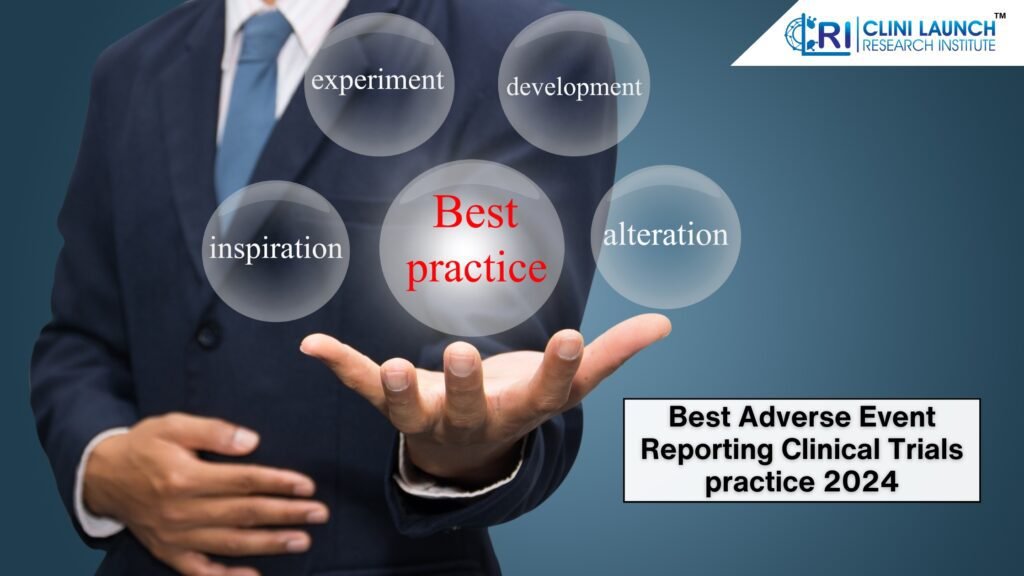Clinical trials are the cornerstone of medical progress, meticulously evaluating new drugs and treatments for safety and efficacy. Throughout this process, patient safety is of the utmost importance, and adverse event reporting clinical trials is essential to guaranteeing both the success of a clinical study and the well-being of the patients. Any negative and unexpected sign, symptom, or abnormality in the laboratory linked to the administration of an experimental medication or medical technology is called an adverse event.
Researchers can detect possible dangers connected with the intervention and make well-informed decisions about whether to continue the trial using effective adverse event reporting. Not only is this data essential for patient safety, but it also makes a major contribution to the significance of adverse event reporting in medical research. Robust adverse event reporting (AE) enables researchers to revise guidelines for adverse event management and develop best practices for adverse event reporting by giving a complete picture of the impacts of the intervention.
Adverse Event Reporting Clinical Trials – The Complexities

Credit: Karthik C (Graphic Designer at CliniLaunch)
Adverse event reporting in clinical trials can be a challenging procedure, despite its important function. Identifying and categorizing AEs is one of the main issues. The picture may be complicated by pre-existing disorders, symptoms may be mild, and it may be challenging to distinguish between an AE and a typical physiological response. The establishment of best practices for adverse event reporting may be hampered by this ambiguity, which may result in underreporting.
Another level of complication is added by negotiating the labyrinth of regulatory requirements and compliance. Adverse event reporting in clinical trials is governed by regulations set forth by regulatory agencies such as the FDA. Adhering to these regulations necessitates close attention to detail.
There are obstacles in data analysis and management as well. A large quantity of data is generated by adverse event reporting, and it is essential to gather, store, and analyze this data effectively. To guarantee data quality and integrity, effective adverse event reporting requires strong data management systems and qualified staff.
Lastly, it is impossible to exaggerate the effect that underreporting has on trial results. Incomplete data sets make possible hazards harder to see and make it more difficult for researchers to evaluate the intervention’s safety profile. Delays in approvals may result from this, endangering patient safety and eventually impeding the clinical trial’s overall success.
Importance of AE Reporting in Medical Research -The CliniLaunch Advantage

Credit: Karthik C (Graphic Designer at CliniLaunch)
Patient safety must always come first throughout research trials. To accomplish this, adverse event reporting clinical trials reporting is essential. Leading research organization CliniLaunch, renowned for its best practices in clinical research, provides researchers with the skills and resources they need to handle AE reporting efficiently.
In order to minimize hazards and guarantee prompt intervention, early detection and reporting are essential. CliniLaunch stresses how crucial it is for research personnel to receive thorough training in order to identify the possible importance of AE reporting in medical research. This entails training staff members on standardized language (such as MedDRA) and cultivating an environment of candid communication where participants feel at ease disclosing any negative experiences.
For proper analysis of AEs, standardized data collection and management are necessary. Electronic data capture (EDC) devices are among the effective data collection techniques that Clinilaunch provides researchers with. By reducing errors and guaranteeing consistency, these solutions enable effective AE management.
The AE reporting process is further streamlined by utilizing technology. CliniLaunch emphasizes the advantages of using specialist software for reporting and tracking aftereffects. This kind of software expedites communication with regulatory bodies, simplifies data processing, and automatically generates follow-up report reminders.
The Ripple Effect – Benefits of the Importance of AE Reporting in Medical Research
One cannot stress the importance of AE reporting in medical research. A well-implemented AE reporting plan has several advantages:
- Enhanced patient safety: Timely identification and reporting of AEs enable prompt interventions, protecting patient well-being.
- Data integrity and reliability: Accurate and complete AE data are essential for drawing valid conclusions from clinical trials.
- Accelerated drug development: Efficient AE management contributes to streamlined regulatory submissions and faster drug approval processes.
- Regulatory compliance: Adherence to guidelines for adverse event management ensures that clinical trials meet regulatory standards.
By prioritizing adverse event reporting and implementing robust strategies, researchers are able to significantly enhance the overall quality and impact of their clinical trials.
A Roadmap to Success – Implementing Effective Adverse Event (AE) Reporting

Credit: Karthik C (Graphic Designer at CliniLaunch)
Building a robust adverse event (AE) reporting system is crucial for safeguarding patient safety and ensuring the success of clinical trials. Here are some key steps:
1. Develop Standard Operating Procedures (SOPs): Clearly define SOPs outlining best practices for adverse event reporting that are essential and cannot be omitted. These SOPs should encompass standardized AE definitions, data collection methods, and reporting timelines.
2. Invest in Training and Education: Comprehensive training for investigators and research staff is vital. This training should cover guidelines for adverse event management, AE identification and classification, and the importance of AE reporting in medical research.
3. Leverage Technology: Utilize electronic data capture (EDC) systems to streamline data collection, minimize errors, and facilitate efficient adverse event reporting. These systems can also automate reminders for follow-up reports and expedite communication with regulatory bodies.
4. Implement Ongoing Monitoring and Evaluation: Continuously monitor the effectiveness of your AE reporting system. This includes evaluating data completeness, timeliness of reporting, and adherence to SOPs
The Future of AE Reporting – Trends and Innovations
The landscape of adverse event reporting is continuously evolving, driven by emerging technologies:
- Artificial Intelligence (AI) and Machine Learning (ML): These technologies hold immense promise for analyzing vast amounts of AE data and identifying potential safety signals more efficiently.
- Predictive Analytics: Utilizing AI and ML, researchers can potentially predict which study participants are at higher risk for specific AEs, allowing for proactive interventions.
- Real-World Evidence Integration: Integrating real-world data with clinical trial data can provide a more comprehensive picture of an investigational drug or device’s safety profile.
CliniLaunch remains committed to staying at the forefront of these advancements, ensuring that our clients have access to the most up-to-date strategies for effective adverse event reporting. Their courses in AI and ML in healthcare and biostatistics equip graduates with the necessary skills to navigate this evolving landscape.
Conclusion
Effective adverse event (AE) reporting is paramount for clinical trial success. By adhering to best practices and leveraging advanced technologies, researchers can enhance patient safety, data quality, and regulatory compliance. CliniLaunch offers comprehensive solutions, including expert training and resources, to optimize AE management. Our commitment to excellence empowers researchers to navigate the complexities of adverse event reporting and achieve optimal trial outcomes. Partner with CliniLaunch to elevate your AE reporting practices and contribute to the advancement of medical science.







I enjoy your writing style genuinely loving this website .
I’m delighted to hear that you enjoy my writing style and are finding this website helpful! It’s always rewarding to know that my work is appreciated.
I haven’t checked in here for some time since I thought it was getting boring, but the last few posts are good quality so I guess I will add you back to my daily bloglist. You deserve it my friend 🙂
Thank you for the good writeup. It in fact was a amusement account it. Look advanced to far added agreeable from you! However, how could we communicate?
Very interesting information!Perfect just what I was looking for!
I precisely desired to appreciate you again. I am not sure the things that I would’ve used in the absence of the type of solutions revealed by you relating to such a field. It previously was a very distressing scenario in my position, however , finding out a new expert tactic you resolved the issue took me to cry for gladness. I’m just happier for the advice and in addition wish you are aware of an amazing job you were putting in educating people via your webblog. I know that you haven’t got to know all of us.
Just want to say your article is as surprising. The clarity on your post is simply cool and that I could suppose you are knowledgeable in this subject. Fine together with your permission let me to grab your feed to keep up to date with imminent post. Thank you one million and please continue the gratifying work.
I am extremely impressed with your writing skills and also with the layout on your blog. Is this a paid theme or did you customize it yourself? Anyway keep up the nice quality writing, it’s rare to see a nice blog like this one nowadays..
Calculate the time difference between two dates: hours, days, weeks, or months.
I admire your piece of work, thankyou for all the great content.
I have been exploring for a little bit for any high-quality articles or blog posts on this sort of area . Exploring in Yahoo I at last stumbled upon this website. Reading this information So i’m happy to convey that I have a very good uncanny feeling I discovered just what I needed. I most certainly will make sure to don’t forget this website and give it a look on a constant basis.
Undeniably believe that which you said. Your favorite reason appeared to be on the net the simplest thing to be aware of. I say to you, I certainly get irked while people think about worries that they just do not know about. You managed to hit the nail upon the top as well as defined out the whole thing without having side-effects , people could take a signal. Will likely be back to get more. Thanks
wonderful submit, very informative. I’m wondering why the other experts of this sector don’t understand this. You must proceed your writing. I’m sure, you have a great readers’ base already!
Thank you so much for your kind attention. Connect with us at +91-9148711600.
Thank you for another magnificent post. Where else could anybody get that type of info in such a perfect way of writing? I’ve a presentation next week, and I’m on the look for such info.